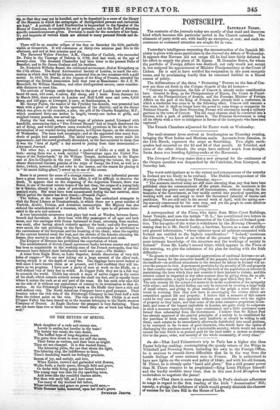A correspondent of the Times who dates from Mitre Court
Buildings, Inner Temple, and uses the initials "D. L," has contributed two letters in the Leading Journal towards the discussion of the Condition-of-Ireland ques- tion. The incognito of the writer is withdrawn by the Morning Chronicle,— stating that he is Mr. David Leahy, a barrister, known as a man of ability and general information, " whose opinions upon all subjects connected with Ireland are entitled to the highest consideration." "Indeed," continues the Chronicle, " we know of no writer of the present day who possesses a more intimate knowledge of the structure and the workings of society in Ireland." From Mr. Leahy's second letter, which appears in the Times ot this morning, we give the substance of his plan for dealing with the Irish difficulty— "No grants to relieve the occasional aggravations of continual distress—no ad- vances of money for the ostensible benefit of the peasant, but the real advantage of the landlord—no artificial stimulants to the demand for labour in Ireland will an- swer the purpose in view. A permanent provision for the security of life and property in that country can only be made by giving the bulk of the population an interest in maintaining the laws which they now consider it their interest to violate; and this interest cannot be imparted in any other manner than by giving them, for an ade- quate consideration, a right to a portion of the soil upon which they live. * * * The only remedy for the actual evil seems to lie in the eradication of the sympathy with crime; and this horrid feeling can only be removed by creating a large body of small owners, and giving to great numbers of the people a more direct in- terest in resisting than they now have in encouraging the crimes which are committed against life and property. I believe that a measure of this nature could be very soon put into operation without any interference with the rights of property as they exist; and that some of the most extensive proprietors in Ire- land, and some of the largest capitalists in London, are quite ready to cooperate in such a measure upon receiving some countenance and a little assistance more formal than substantial from the Government. I believe that Sir Robert Paid has already approved of the general principles of a society to be established for the purchase of Irish estates from such landlords as should be willing to sell them; each estates to be immediately, afterwards distributed into small portieus to be conveyed in fee to men of good character, who would have the option of discharging the purchase-money by a terminable annuity, which would not much exceed the rent which is at present paid for the land under a system so destruc- tive to the peace, order, and security of the whole community, of every class."


























 Previous page
Previous page